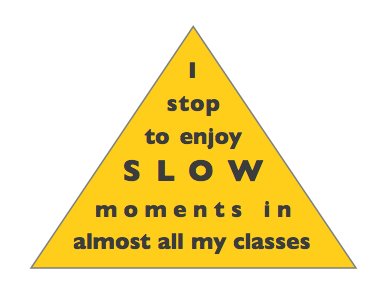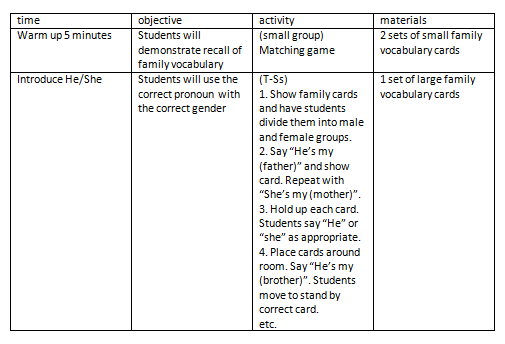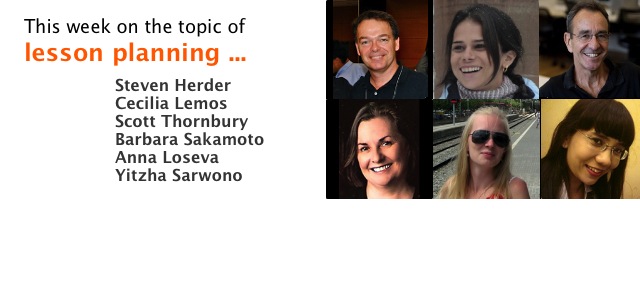Don’t let a lesson plan stifle magical moments
Has this ever happened to you? You discover some new thing and suddenly you notice it everywhere. This happened with the first car I bought in university: a 1964, baby blue VW beetle. It was 400 dollars and had a homemade wooden floor. The funny thing about this, though, was that having bought a VW beetle, I suddenly began to notice other VW Beetles. They were, in fact, everywhere. This very same phenomenon is happening in my classroom with what I have coined, SLOW moments.
Slow down
These Spontaneous Learning Opportunity Windows (SLOW) are serendipitous moments when everyone is suddenly focused on exactly the same thing. It may be triggered by a student’s comment, a joke, a mistaken answer, something from the textbook, or something I just said. At that moment, everyone’s brain has stopped and a small window has opened. If you are ready, it is very easy at that moment to slide something through the window and into the student’s brain. It actually gets easier and easier the more you keep an eye open for these SLOW moments.
Classroom interaction
The SLOW strategy can improve your teaching by exploiting classroom interaction during a class. Since these interactive decisions must be made on the spot, this technique takes some practice (Google Allright; Bailey; Wajnyrb; Tsui; or Nunan and classroom interaction for lots more).
To get started, there are three things necessary to become adept at exploiting a SLOW moment: 1) confidence, 2) awareness of the syllabus and 3) the ability to riff like a jazz musician. If you don’t believe in yourself when you go off-script, you risk the students also not believing you. Secondly, you need to know the syllabus so you can make sure that everyone succeeds in being able to do what you ask them to do, using meaningful language that isn’t too far away from what you’re doing or have done in the past. Finally, riffing simply means improvising with some underlying intention. So, here are some examples of a few things that led to SLOW moments:
Whining
Yuki complains that she’s hungry (Onaka heta). Yuki is always hungry, every week, like clockwork. So, I call out, “Yuki is hungry again. Yuki, this morning I had a big breakfast. I had 2 pieces of toast – one with peanut butter and one with honey. What did you have? Nothing? Really? Everyone – Why do you think Yuki didn’t have any breakfast? (Elicit ideas and give feedback) OK, let’s give Yuki some good ideas to help her fix her life. Yuki, I think you should _____. Anyone else? What should Yuki do?
Reporting
Chikako reports, “I went *to shopping and *studying English last night.” I call out in a cheesy quiz show host voice, “Double chance!” and suddenly we are all in the same moment. “Can anyone find two small mistakes?” Then, “Can anyone else give me a two-verb sentence about last night?” Can anyone ask Chikako if she bought anything cool?
Worrying
Miki asks, “What’s on the test?” I call out, “Miki sure loves tests! Miki, what do you think is on the test? If you were Steven, what would you put on the test? Everyone, ask your partner, “What do you think TERRIBLE Steven will put on the test?” Ready… Go. (Time passes…) OK, let’s review what could be on the test.”
Killing time
Hiromi suggests, “Let’s play a game today.” I call out, “Hiromi is the queen of “killing time” What does it mean in Japanese? Yes, exactly, jikan wo tsubusu. In this class, who else is good at killing time? Which teachers are weak against these killing time queens?” “Everyone, ask your partner, how do you sometimes kill time?”
Writing
Yuri writes, “I take… *on the train to school every day” while I’m walking around the room during a writing assignment. When I see this mistake, I call out (knowing that this student will laugh rather than being embarrassed) “Wow, Yuri, you are a very macho girl. Everyone, do you know how macho Yuri is? Every morning, she takes on* the train (I gesture putting on a train like a backpack). There are two or three good ways to say this. Anyone? Yes, “take the train”, “catch the train”, “get the train”… great.
Hidden bonuses
This technique is actually full of hidden bonuses: it builds extra rapport with students, it teaches students to learn from other students, it promotes consciousness-raising, and it encourages active participation. The more you invest time into observing what is ACTUALLY happening in your classroom, the better your lessons will be.












